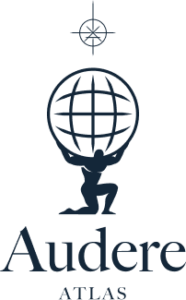
Tags
Share
Russian Proxies
Welcome to the Audere Atlas, the Audere Group’s fortnightly update on global geopolitical trends, how we engage with them, and what they mean for your organisation.
This issue takes a closer look at Russian proxies and covert activity, specifically in Europe and Africa, exploring how businesses can mitigate this diverse phenomenon’s disruptive and destabilising effects as part of their investment cycle.
The Audere Atlas offers timely, actionable insights that both support key decision-making and highlight areas for further exploration and understanding.
Russia’s Proxy War
Russia’s escalating use of proxies in Africa and growing confidence in the use of covert action in Europe is fomenting instability. This has implications for businesses, as increased ‘grey zone’ warfare and destabilisation campaigns threaten operations, disrupt supply chains, and undermine stability in regions crucial to Western interests.
Russia’s asymmetric, or ‘grey zone’ warfare is intensifying. Its varied use of proxy groups in Africa is consolidating Kremlin influence over areas of strategic significance—not to mention emboldening despotic regimes—while increasingly bold use of ‘active measures’ in Europe is sowing division and disrupting Western support for Ukraine. In both arenas, Moscow is fomenting destabilisation, using every trick in the book to subvert the rules-based international and further its strategic goals.
Russia’s military footprint has been growing in Africa for many years, but it has expanded at an alarming rate following the invasion of Ukraine in February 2022. This began under the banners of the Wagner Group, a Kremlin-aligned, but officially ‘private’ military company (PMC), that signed security agreements with several African states to do everything from combating Jihadists to protecting gold mines and timber forests. Wagner has since been disbanded, following its ill-fated mutiny in June 2023 and the death of its leader, Yevgeny Prigozhin, a month later. But little has changed substantively, with Wagner’s African battalions re-branded the ‘Africa Corps,’ operating under the direct control of the Russian Ministry of Defence for the first time.
The Africa Corps, like Wagner before it, is deeply entangled in local conflicts in Libya, Burkina Faso, and the Central African Republic, as well as the growing insurgency in Mali and the ruinous civil war in Sudan. Its command and control reshuffle since 2023 has helped to centralise previously diverse military operations in Africa and align them more closely with Russian state objectives, namely supplanting Western powers as the preferred security partner of regional states.
In the Sahel, for instance, a concerted propaganda campaign leveraging sophisticated mis- and dis-information deriding Western, namely French ‘neo-colonialism,’ coupled with generous military aid allocations and diplomatic overtures to local military regimes, has seen Western pressured to leave, or outright ejected from several countries where they have long held sway.
This apparent strategic success has not brought security to the region. In August 2024, Russian and Malian troops were ambushed by Jihadists and Tuareg rebels near Tinzaouten, where 84 Russian and 47 Malian soldiers were killed. The rebels’ use of drones, a tactic possibly supported by al-Qaeda affiliates, marks a serious escalation in rebel capabilities, not only causing devastating casualties among Russian forces but demonstrating Moscow’s abject failure to suppress a now decades-long conflict. On top of allegations of Russian atrocities, characterised by sexual violence and extrajudicial executions of civilians, the fragility of Moscow’s argument that it is ‘liberating’ Africans from Western Imperialism is marked.
Meanwhile, in the context of its ongoing assault against Ukraine, the scope of covert Russian operations is expanding in Europe. This is partly informational. As revealed by a recent FBI investigation, Russia is attempting to fracture Western political unity with disinformation, including by using fake media websites mimicking reputable outlets such as Reuters and Le Monde to exploit local grievances and frame them in a manner that divides communities and derides support for Ukraine.
The UK, Germany, France, and Italy have been conspicuous targets, although strategy has differed from one state to the next. In Germany, Russia has sought to capitalise on public discontent over energy costs and sanctions, while in France, Britain, and Italy, the disinformation campaigns have primarily aimed at stoking social unrest by promoting xenophobia and anti-immigrant sentiment. Russia is alleged to have played a role in stoking recent riots in the UK—estimated to have cost the UK economy up to £400m—by leveraging disinformation campaigns, social media manipulation, and covert support for extremist or fringe groups to exacerbate social tensions and division
Russian intelligence agencies have engaged in more Cold War-style, kinetic disruption, including sabotage and cyberattacks against Kyiv’s allies in Europe and beyond. Aiming to physically disrupt aid to Ukraine, such activity has allegedly ranged from arson attacks against train lines in Sweden, Germany, and Czechia, as well as a London warehouse storing Ukrainian aid, to explosions targeting a weapons facility in Wales and ammunition plants in Pennsylvania and Arkansas.
From the Sahel to Western Europe, Moscow’s twin tools of modern informational warfare and old-fashioned subterfuge are becoming less restrained and more widespread.
So What?
The implications of these destabilising activities are wide-reaching, presenting both immediate and longer-term risks. Companies must grapple with increased security risks and potential disruption to supply chains as Russia’s asymmetric activity creates volatility on an increasingly broad scale.
In Africa, for instance, the escalating violence and waning rule of law associated with Russia’s growing influence pose a direct threat to local companies and multinationals alike. Specifically, extractives in the oil and gas or mining sector, as well as infrastructure-heavy industries such as telecoms and construction, may face growing strain on the security of operations, assets, and personnel.
Indirect consequences extend to the broader business ecosystem, with supply chains reliant on African raw materials and commodity traders likely to face greater disruption. Heightened instability could increase the costs of securing logistics routes, delay production, and force businesses to reassess their operational strategies in the region, while the growing militarisation of conflicts, exacerbated by Russia’s involvement, likewise increases the likelihood of sanctions complicating the local business environment.
In Europe, Russian campaigns pose a subtler but equally significant threat to enterprise. Defence companies in Europe are increasingly targets of direct sabotage and offensive cyber operations, but so too are key logistics networks and other strategic industries and infrastructure. More broadly, as incitement and disinformation target political divisions in key European markets, businesses may find themselves operating in increasingly unpredictable environments.
Moscow’s cooperation with Beijing in espionage and influence operations adds another layer of complexity. Both nations are targeting European politicians and far-right activists, exploiting vulnerabilities in Europe’s political landscape to advance their shared goal of undermining Western democratic institutions. There is a realistic possibility this indirect collaboration will continue to extend beyond intelligence gathering, with both Moscow and Beijing amplifying each other’s disinformation to sow confusion and discord across the continent.
In response, businesses need to bolster their risk management strategies. This may include taking steps to diversify and build resilience in supply chains or factoring geopolitical and geoeconomic risk analysis into strategic planning. It will likewise require closer monitoring of local and international developments to better respond to emergencies affecting assets or employees, as well as developing contingency plans to counter the potential fallout from geopolitical instability. As Russian proxies continue to destabilise critical regions, businesses must remain vigilant and proactive in managing both the direct and indirect impacts of this growing threat.
Keen to know more?
The evolving geopolitical landscape presents both challenges and opportunities. Organisations need to evaluate the potential impact on operations of ongoing conflicts, including those which—like Russian proxy activity—are conducted in the ‘grey zone.’ The risk of supply chain disruptions, shifting regulatory environments, and fluctuations in commodity prices require proactive mitigation strategies, including forming strategic alliances and investing in robust risk management solutions.
The Audere Group offers tailored risk advisory services to help businesses manage the complexities of operating in volatile environments. Our integrated intelligence, investigations, and security teams offer actionable insights, enabling clients to anticipate and respond to emerging risks effectively. Having supported clients since 2014, our team of experts is equipped to offer the strategic analysis and risk advisory services necessary to navigate these challenging times.
Contact us to learn more about how our bespoke services can help you safeguard your interests and capitalise on new opportunities.

Disclaimer: The content of this report is for informational purposes only and does not constitute legal or financial advice. For further details or specific inquiries, please reach out to our team directly.





